The music industry has always been fast-paced and making a name in it is seemingly reserved for an illustrious few. But every year, a few new independent artists break through to the scene, and one of two things happen - they either immediately catapult themselves to extreme fame or fizzle out after enjoying five minutes of fame (looking at you, Gotye).
Independent artists or indie artists find it more challenging than others to take their music and skills to the professional level. Many blogs and online resources try and help them to make it to the big stages, but most advice is outdated or not applicable on most.
Hence, this piece has factored in the best practices for every indie artist to help you make it into the big leagues. Our advice and suggestions come straight from some of the biggest names in indie music.
By the end of this 7-minute read, you’ll find out what helped them become global stars and how you can follow in their footsteps with similar achievements.
What’s In It For The Independent Artist?
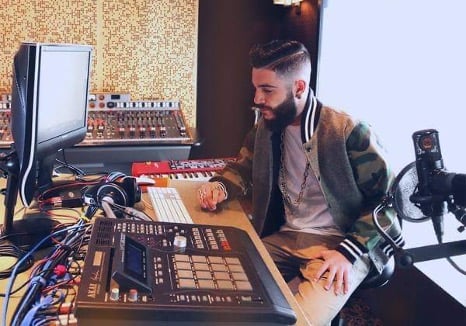
Pop culture has tried time and time again with movies like Bohemian Rhapsody, A Star is Born, and my personal favorite, The Rocker, to show the complexities of the music industry. But none of the attempts can hold a candle to how the industry is for independent musicians.
It’s no accident either. There are only so many cases of familial stigma, social network bullying, and ostracization that movies can fit in two hours. The reality of the situation is often far more challenging and can be a real test for most individuals looking to pursue this passion as a serious career.
But one aspect that movies seldom fail to include is the artist’s communication with the major record label vying for their signature. This inclusion is purposeful, however, as the most significant decision most indie artists have to make is whether to stay independent or sign with a record label.
The movies may portray the record companies and their executives as greedy villains, but is there any truth to this perception? Should you decide to venture out on your own, and if so, what are the potential benefits of remaining a full-time independent artist?
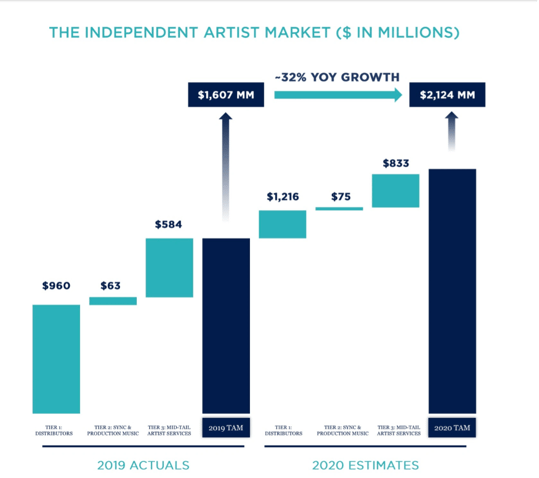
There are a lot of factors to consider here, and you need to be well-versed in all the advantages and disadvantages of choosing to go solo.
What Do Record Labels Bring To Independent Artists?
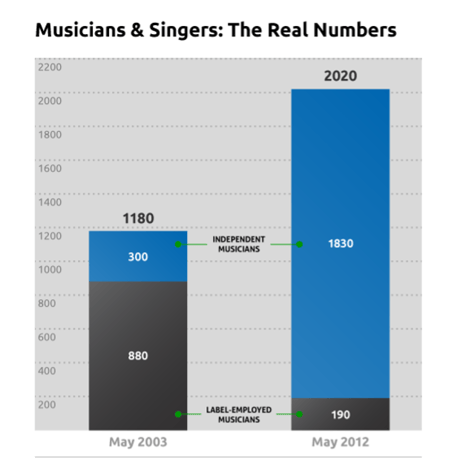
Short answer: a lot. Record labels (and good ones like Warner, Sony, and Interscope) have a fantastic reputation for managing the most prominent talents in the business and for being responsible for introducing a lot of the names in the charts today.
Record labels also fund the artist’s albums and help market them globally or nationally. They manage all aspects of the artist, from scheduling live shows to press tours to managing music release cycles.
But there’s a reason why record labels are still the villain in every story - they take away the artist’s individuality with the sole purpose of churning out music from them. But to get maximum returns on the investment, they inflate an artist’s public image, direct the type of songs they should be making, micro-manage their entire public persona, and place strict deadlines and pressures to deliver on all fronts.
It’s no surprise why many indie artists function as independent record labels. Ignoring the industry route can enable the artist to be in control of their craft, their personality, and their creative process.
So, what are the benefits of remaining independent?
You decide your marketing strategy, demographic, and image
No pressure on delivering the next big hit
No third-party stakeholders in your revenue generation
Adaptability to the evolving music scene
Adaptability matters a lot to every artist. Spotify and other music streaming services, for instance, were in their infancy a decade ago but have now taken the music industry by storm.
Record labels are, for better or worse, usually married to their ideas and catch on to recent trends pretty late on. When artists began to use the monetization features of music streaming services, most major record label companies still insisted on churning out CDs and shooting expensive music videos featuring scantily dressed, lingerie-clad women, for dedicated TV channels.
All these positives can influence your decision, but let’s be honest here, you’re not reading this piece because you needed a rundown on reasons to avoid record labels. You've already decided to become an indie artist.
Now that this solo army marches forward, how do you ensure to make the most out of this expedition?
Let’s find out.
Proven Ways to Make It As A Successful Independent Artist
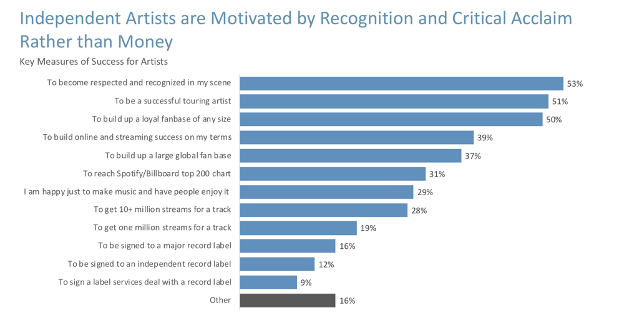
For most independent artists, their lucky break or a successful opportunity may never arrive. That’s just how the industry works.
There’s a massive pool of talented musicians and songwriters that will probably never make it to the big leagues. That is unless they lay the foundations independently to maximize their growth and visibility in a highly digitalized world.
Here’s how you can begin:
I. Keep Writing Music
Major artists never stop writing new material. They’re either tirelessly working away to secret new arrangements or beats or writing fresh lyrics to songs they haven’t even started on yet.
The music business, from an independent standpoint, is a constant hustle to improve and be a step ahead of the competition. Or be different enough to look like you’re paving the way for a new genre.
Billie Eilish, for instance, wrote songs for years with her brother Finneas before her song, “Ocean Eyes,” was the most played song on SoundCloud. That was her break.
Billie and Finneas still continuously work on new music and practice songwriting. Indie artists need to take a leaf from established artists and work on their craft.
A songwriter’s best development is the art of writing, and producers benefit from making new mixes, arrangements, loops, or melodies. Online platforms or stores can help spice up your music production with a vast library of custom samples.
But remember to be patient and give plenty of time to yourself to develop and critique your work instead of rushing to finish it. Not all ideas need to see the light of day and if you’re stuck on one, discard it and move on.
II. Always Practice Your Craft
Practice is essential to excel at any craft. The gym is where half the battles are won - and artists aren’t athletes, so the most extensive pre-workout they require is in their skill.
Regardless of how well you play your instruments currently, you could invariably improve, improvise, experiment, and adapt. Focused practice keeps you on your toes, and rehearsing songs and using diverse techniques for recording vocals will highlight any issues you face and underline the resolutions to overcome them.
Bands can also benefit from practicing together and playing regularly. If you're in a band, make sure you get together regularly to play together. The more time you spend together working on your skill sets as a group, the more you’ll naturally learn from each other.
Eventually, your band will familiarize themselves with every member’s weaknesses and strengths until this understanding becomes second nature. It will help you perform better individually and as a group.
III. Become Your Manager
Becoming a great musician is part of the problem for an independent artist. A lot of work goes behind the scenes to ensure your career takes off.
Employing a dedicated music manager can be an excellent way to pursue all the opportunities around you, but most independent artists don’t have the capital to hire one. If you’re in a similar position, taking the time out to understand and implement the managerial ropes is essential to your career.
A music manager’s job role includes the following tasks:
Organizing band members
Booking gigs
Scheduling rehearsals
Networking
And even quality assurance support when needed
Managing all tasks can be difficult, and most times, impossible to be managed by one band member or solo artist - especially if they have to focus on writing and performing music too.
If possible, you should distribute tasks amongst the band but ensure there are open lines of communication and complete transparency in their fulfillment. Support any band members that step up to the plate to take on responsibility.
Nothing will replace the real deal, however…
Managers aren’t only personal assistants, glorified resume profilers for musicians, or paper-pushers as many may be led to believe. They have a solid network of contacts and connections that can help you land bigger gigs and collaborations.
If you can find the capital to invest in a manager, invest in a manager.
IV. Leverage The Power Of Social Media
Do you know why Charlie Puth and Chance the Rapper are big on TikTok and other social media these days? Because it works.
The clout generated by social media is unparalleled compared to traditional media. As unavoidable as it may seem these days, social media is the best tool to boost your profile as an independent artist.
Social media provides a platform to share your music and express yourself directly to your followers instantly. It’s a formula that keeps working too, and one that Saudi Arabian viral music sensation, Mishaal Tamer found out first-hand.
Mishaal documented his musical journey on his Instagram and TikTok account while he studied in the U.S and eventually landed on radio stations in his home country. Today, he boasts more than a million monthly listeners on Spotify.
Here’s how you can do the same:
1 Don’t Spam
Spamming is a grave internet sin and is just as ineffective a tactic as ever for musicians too. Not everyone is going to like and follow your music, being incessant can come across as needy if they’re not interested.
2 Make Inclusive Content
Social media is all about engagements and the more you can curate your way, the more it'll translate into visibility. Give your followers something to engage with: produce a song with them on Instagram Live, set up polls, and keep them informed on your music process with pictures and videos.
3 Adapt For Every Platform
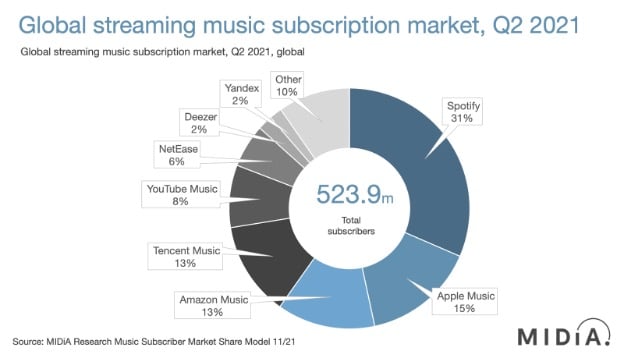
How you interact with your audience on Twitter is going to be vastly different from Instagram. Don’t post the same message across all your channels and tailor them to best suit the platform you are using.
4 Sponsored Posts
Certain posts can reach a wider audience if you sponsor them properly. Affiliate marketing with a marketing agency like Digitarial can also help bring in affiliate brands to advertise on your platforms while you make valuable sponsorship connections.
5 Build A Website
Everyone these days has multiple social media platforms for their music reachability but building a professionally designed website can make things look professional. All the pros have their websites designed with accompanying apps developed by experts to display media, ticket information, and band information. DIY website builders can also be used.
V. Produce It Yourself
Without the backing of a distributor or a record deal, any unsigned artist would have to ensure their money goes where it matters the most. A tight budget may have held you back when recording or producing music in the past, but with cheap DAWs, plugins, and other production equipment, almost anyone can begin immediately.
Jon Bellion is a great example of this. The artist is renowned for his independent music style, often spending hours in the studio dishing out adlibs and vocals for songs.
Macklemore is another prominent independent artist who follows the same methodology. Today’s music career doesn’t rely too heavily on instruments or a scholarship in music theory.
All you need is a laptop, and the confidence and self-belief to learn and make mistakes along the way. Save money for upgrades and instead of focusing on the latest Air Jordans or KURU Footwear, buy accessories and equipment that’ll elevate your music production capabilities.
VI. Release Your Music
The internet has been a game-changer for the music market. A quick upload to SoundCloud or YouTube can allow your fan base to hear your music in an instant.
Ever since the days of MySpace, people have leveraged the power of the internet to market their music and ensure it gets to the listener's ears. DJs and bands routinely churn out their music online, but very few get the clicks they desire - so what’s going wrong for them?
The consumption of music has changed with time. Making a playlist on Spotify can allow users to get access to all forms of music in a single library.
Getting your music out there without the help of a dedicated PR company can be a tricky business. A lot of artists are crying for the same space as you.
Here’s how you can get ahead of the rest:
A. Finish The Music
A half-baked idea won’t take you very far. Make multiple songs and select a few that you feel are the strongest singles.
Pick one from the list, record, mix, and master it before you begin the releasing process. It could apply to a single song or an Extended Play (EP) too.
B. Create A Timeline
Create a timeline with key dates. This will help you visualize the release process far before it begins. Allow yourself a few months of planning and preparation so you're not in a mad rush and you give yourself time to build anticipation with your fans.
C. Digital Distribution And Licensing
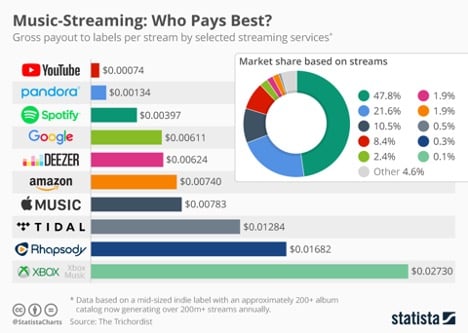
Apple Music and Spotify are popular music streaming sites and have a wide user base with methods to further promote your music to new listeners. Ensure you have time for this as a digital aggregator will need to verify your music to streaming services (including artwork).
You can even license your music at this stage. Tunecore is a platform where you can license and sell your music online. You can also use Tunecore to put your music on Amazon Music. Investing in an AI-based repricing tool can also be beneficial if your music rates are to change on streaming or purchasing platform.
D. Promotion
Promotions leading up to the release of your single or album are essential as they help create the buzz required in the fan base. Generate buzz and excitement in the community by drip-feeding content like teaser videos, pictures, and song clips.
And while you’re slowly releasing content, allow yourself the time to send your music to blogs, YouTube reaction channels, tastemakers, and other contacts for feedback.
More than anything, the entire music release cycle demands a lot of patience from the independent artist. Having a structured plan can provide you with a host of benefits and market your music well, as opposed to releasing it all in one go.
Conclusion
And there you have it…
Becoming an independent artist isn’t an easy job. Focusing on your solo music career is far more challenging than having a desk job or becoming an eBay selling manager.
But it can be done. Most independent artists working today have more or less gone through the very tips we’ve provided to you today.
This article will not only help you on your journey towards a successful career as an indie artist but may also mitigate a lot of the stresses and possible medical issues that may come your way as a result of it.
We hope you enjoyed today’s piece, and for more information on all things music, visit our blog. Leave a comment if you’ve got a tip you’d like to see included here.
Author Bio: Burkhard Berger is the founder of Novum™. Follow Burkhard on his journey from $0 to $100,000 per month. He's sharing everything he learned in his income reports on Novum™ so you can pick up on his mistakes and wins.

















_Cropped.png?width=1600&name=02%20(2)_Cropped.png)




















Your Comments :